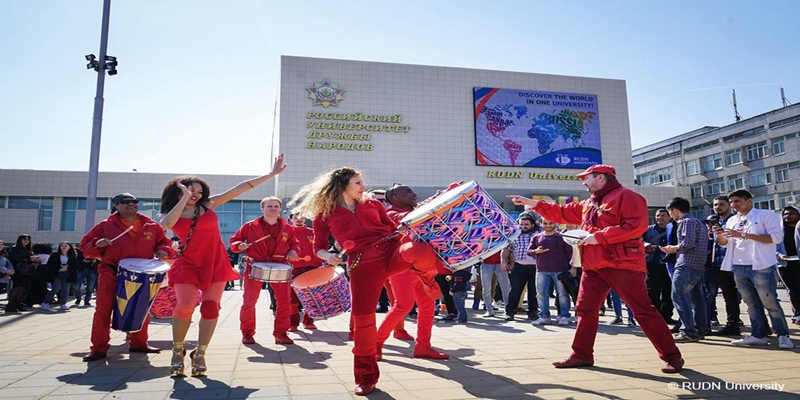Fostering Russia-Africa Academic Scholarships

As federal government scholarships are highly limited, Russia's educational institutions are ready to train more and more specialists on tuition paying basis for Africa. There are plans to boost the number of African students, but currently, approximately 60% of the total African students are on private contracts in the Russian Federation.
"The present and the future of Russia-Africa relations is not about charity, it's about co-development," states Evgeny Primakov, Head of the Russian Federal Agency for International Humanitarian Cooperation (Rossotrudnichestvo) and also a member of the Secretariat of the Russia-Africa Partnership Forum.
The Secretariat of the Russia-Africa Partnership Forum was created in 2020. Working under the Russian Foreign Ministry, it has, under its aegis, three coordination councils namely business, public and scientific councils. Primakov heads the humanitarian council that deals with education and humanitarian questions for the Foreign Ministry.
Primakov observes that the number of Russian state scholarships for African citizens - for the whole continent made up of 54 African countries - increased from 1765 in 2019 to 1843 in 2020. At the same time, the number of applications submitted has decreased.
According to Primakov, due to the coronavirus outbreak, some African governments have decided not to launch the application campaign for Russian universities for the academic year 2020/2021 as there are difficulties with transportation, safety, and financing scholarships allocated in the African state's budget.
He urges the Russian system of higher education to adapt to the new realities to gain more value on the international market. Russia has to facilitate Africa's openness to this sphere of education. Russian educational institutions could open their doors to the growing number of African elites, estimated at 350 million, almost the same size of the United States and double the population size of Russia.
The Russian Federal Agency for International Humanitarian Cooperation currently operates eight representative offices in Africa: Egypt, Zambia, Morocco, Republic of the Congo, Tunisia, Tanzania, Ethiopia and South Africa.
During the Russia-Africa inter-party conference held in late March 2021, Foreign Minister Sergei Lavrov offered an assurance that Russia would increase development engagement with Africa in diverse areas. Russia has a lot to offer African countries in terms of mutually beneficial cooperation.
"In the past few years, Russia-Africa cooperation has been noticeably stepped up. We are deepening our political dialogue, developing inter-parliamentary ties, promoting cooperation between ministries and departments and expanding scientific and humanitarian exchanges," observes Lavrov.
On education and training of specialists for Africa, Lavrov says that "over 27,000 African students study in Russian universities." This represents a significant increase by 9,000 students, up from approximate 18,000 as given figure in October 2019.
About four or five months after the first Russia-Africa summit, the World Health Organization (WHO) declared the coronavirus pandemic. Nearly all countries locked down and civilian (passenger) air transport or aviation links were completely paralyzed.
Statistics on African students are, in fact, still staggering. When contacted, the Russia's Ministry of Science and Higher Education declined to give the current figure for Africa.
Answering questions at a meeting with the students and staff of Moscow State Institute of International Relations (MGIMO) University, in September 2019, Foreign Minister Sergei Lavrov pointed out that there were 15,000 Africans studying in Russia, and about a third (that is 5,000) of them had received scholarships provided by the Russian state. That same year during the inter-parliamentary conference, Chairman of the State Duma, Viacheslav Volodin, said that cultural and educational cooperation need to intensified in Russian-African relations. Volodin urges that legislation in the scientific and educational spheres be harmonized.
Professor Vladimir Filippov, Rector of the Russian University of People's Friendship (RUDN), formerly Patrice Lumumba Friendship University, has underscored the fact that social attitudes toward foreigners first have to change positively, the need to create a multicultural learning environment, then the need to expand and deepen scientific ties between Russia and Africa.
Established in 1960 to provide higher education to Third World students, it later became an integral part of the Soviet cultural offensive in non-aligned countries. His university has gained international popularity as an educational and research institution located in southwest Moscow.
In order to earn revenue, Russia's Ministry of Science and Higher Education has already launched a large-scale educational campaign abroad targeting to recruit private foreign students on tuition paying contract annually into its educational institutions across the Russian Federation.
Experts from the Moscow based Center for Strategic Research indicate that the percentage of Russian universities on the world market is considerably low. Due to this, there is a rare need to develop Russian education export opportunities, take progressive measures to raise interest in Russian education among foreigners.
Russia has been working on opportunities and diverse ways to increase the number of students, especially tuition paying agreements for children of the growing elite families and middle-class from African countries at Russian universities.
Russian President Vladimir Putin during the first Russia-Africa Summit said that he would help identify new areas and forms of cooperation that would bring the collaboration between Russia and Africa to a qualitatively new level.
Putin observes that by the mid-1980s, Russia had built about a hundred educational establishments in Africa and half a million Africans have been trained for work at industrial companies and agricultural facilities in African countries. He specifically notes the good dynamics of specialist training and education in Russian educational institutions for African countries.
Russian and African participants mapped out broad initiatives in the sphere of education during the first Russia-Africa Summit in Sochi. For the joint work, there was a final joint declaration, adopted by the participants after the Sochi summit. The document outlines a set of goals and objectives for the further development of Russian-African cooperation. The next Russia-Africa Summit is planned for 2022.
By Kester Kenn Klomegah
The author is a versatile researcher and a passionate contributor, most of his well-resourced articles are reprinted elsewhere in a number of reputable foreign media.
